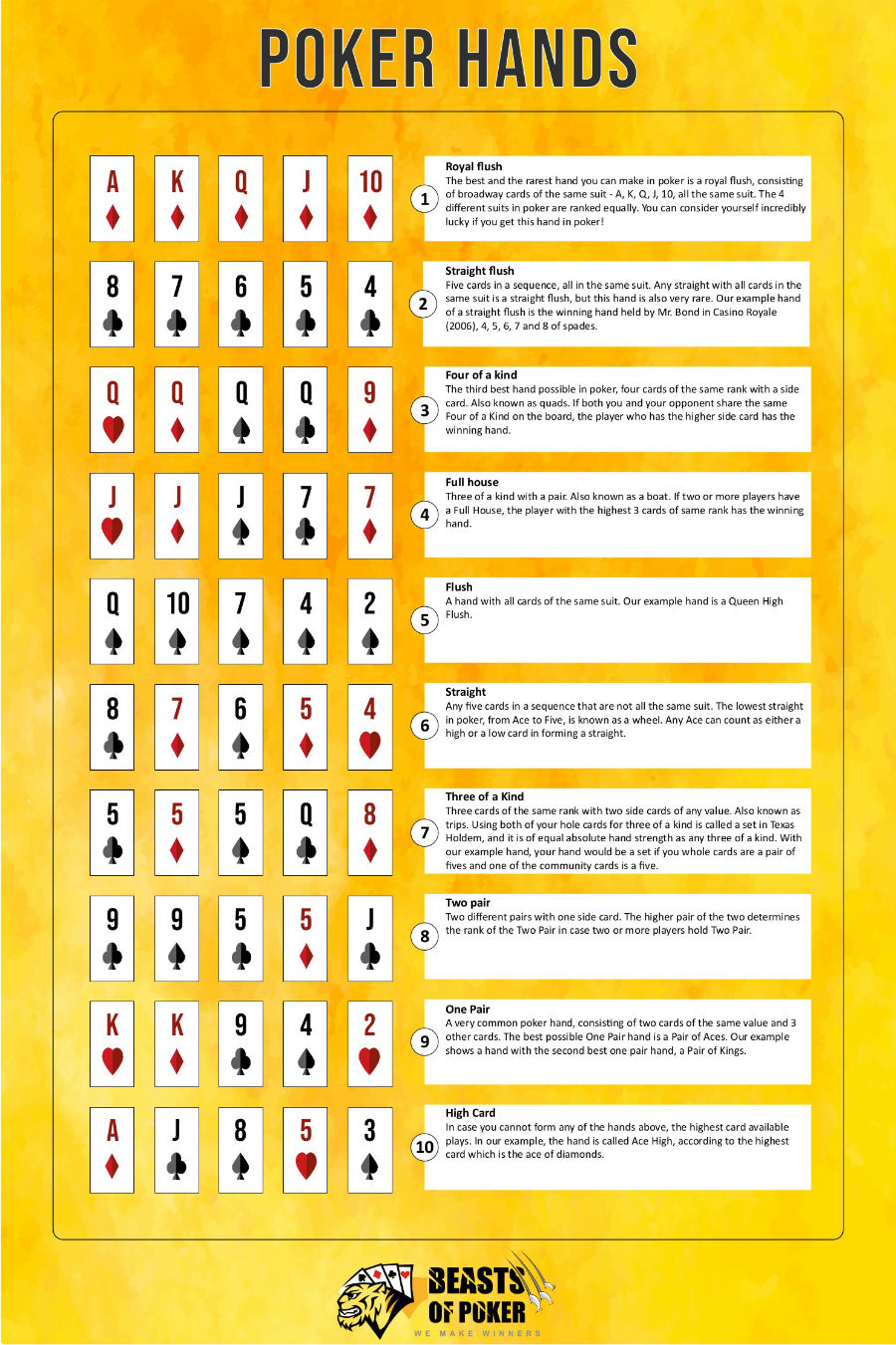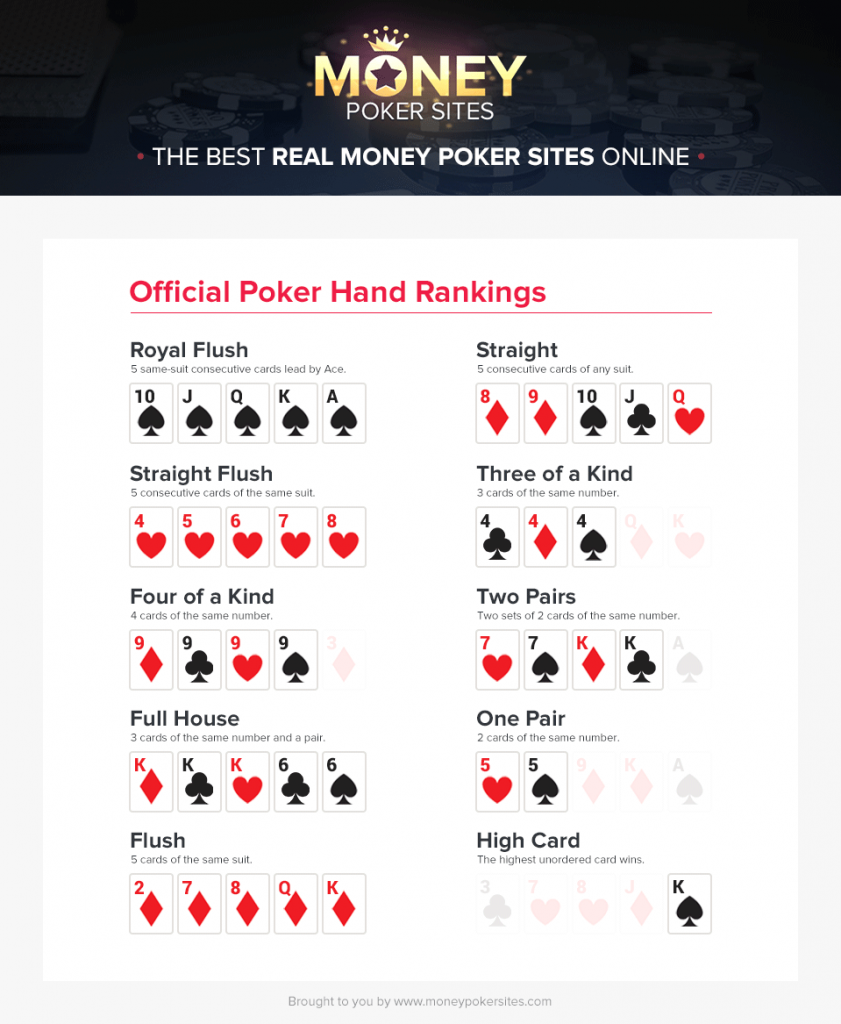How Many Different Poker Hands Are There
Well, basically there are many variances of poker. Three families of games are much more common than others: draw games: a. 5 card draw/triple draw - player get 5 cards and each round has the ability to replace one or more cards from his/her hand. Winner in the one holding the high ranked hand. Hand Combinations in Poker November 21st, 2019 14:26 Poker is a game of skill wherein you can get up to 169 different combinations of starting cards. The hole cards play a key role in determining your proficiency in the game.
- How Many Different Poker Hands Are There
- How Many Different Poker Hands Are There Better
- Combinations In Poker
Sanderson M. Smith
Home About Sanderson Smith Writings and Reflections Algebra 2 AP Statistics Statistics/Finance Forum
In many forms of poker, one is dealt 5 cards from astandard deck of 52 cards. The number of different 5 -card pokerhands is
A wonderful exercise involves having students verify probabilitiesthat appear in books relating to gambling. For instance, inProbabilities in Everyday Life, by John D. McGervey, one findsmany interesting tables containing probabilities for poker and othergames of chance.
How Many Different Poker Hands Are There
This article and the tables below assume the reader is familiarwith the names for various poker hands. In the NUMBER OF WAYS columnof TABLE 2 are the numbers as they appear on page 132 in McGervey'sbook. I have done computations to verify McGervey's figures. Thiscould be an excellent exercise for students who are studyingprobability.
There are 13 denominations (A,K,Q,J,10,9,8,7,6,5,4,3,2) in thedeck. One can think of J as 11, Q as 12, and K as 13. Since an acecan be 'high' or 'low', it can be thought of as 14 or 1. With this inmind, there are 10 five-card sequences of consecutive dominations.These are displayed in TABLE 1.
 TABLE 1
TABLE 1The following table displays computations to verify McGervey'snumbers. There are, of course , many other possible poker handcombinations. Those in the table are specifically listed inMcGervey's book. The computations I have indicated in the table doyield values that are in agreement with those that appear in thebook.
How Many Different Poker Hands Are There Better

Combinations In Poker
N = NUMBER OF WAYS listed by McGervey | |||
Straight flush | There are four suits (spades, hearts, diamond, clubs). Using TABLE 1,4(10) = 40. | ||
Four of a kind | (13C1)(48C1) = 624. Choose 1 of 13 denominations to get four cards and combine with 1 card from the remaining 48. | ||
Full house | (13C1)(4C3)(12C1)(4C2) = 3,744. Choose 1 denominaiton, pick 3 of 4 from it, choose a second denomination, pick 2 of 4 from it. | ||
Flush | (4C1)(13C5) = 5,148. Choose 1 suit, then choose 5 of the 13 cards in the suit. This figure includes all flushes. McGervey's figure does not include straight flushes (listed above). Note that 5,148 - 40 = 5,108. | ||
Straight | (4C1)5(10) = 45(10) = 10,240 Using TABLE 1, there are 10 possible sequences. Each denomination card can be 1 of 4 in the denomination. This figure includes all straights. McGervey's figure does not include straight flushes (listed above). Note that 10,240 - 40 = 10,200. | ||
Three of a kind | (13C1)(4C3)(48C2) = 58,656. Choose 1 of 13 denominations, pick 3 of the four cards from it, then combine with 2 of the remaining 48 cards. This figure includes all full houses. McGervey's figure does not include full houses (listed above). Note that 54,912 - 3,744 = 54,912. | ||
Exactly one pair, with the pair being aces. | (4C2)(48C1)(44C1)(40C1)/3! = 84,480. Choose 2 of the four aces, pick 1 card from remaining 48 (and remove from consider other cards in that denomination), choose 1 card from remaining 44 (and remove other cards from that denomination), then chose 1 card from the remaining 40. The division by 3! = 6 is necessary to remove duplication in the choice of the last 3 cards. For instance, the process would allow for KQJ, but also KJQ, QKJ, QJK, JQK, and JKQ. These are the same sets of three cards, just chosen in a different order. | ||
Two pairs, with the pairs being 3's and 2's. | McGervey's figure excludes a full house with 3's and 2's. (4C2)(4C1)(44C1) = 1,584. Choose 2 of the 4 threes, 2 of the 4 twos, and one card from the 44 cards that are not 2's or 3's. |

'I must complain the cards are ill shuffled 'til Ihave a good hand.'
-Swift, Thoughts on Various Subjects
Home About Sanderson Smith Writings and Reflections Algebra 2 AP Statistics Statistics/Finance Forum
Previous Page Print This Page
Copyright © 2003-2009 Sanderson Smith